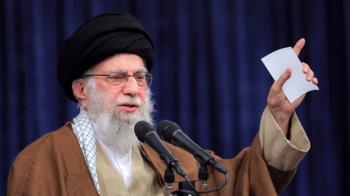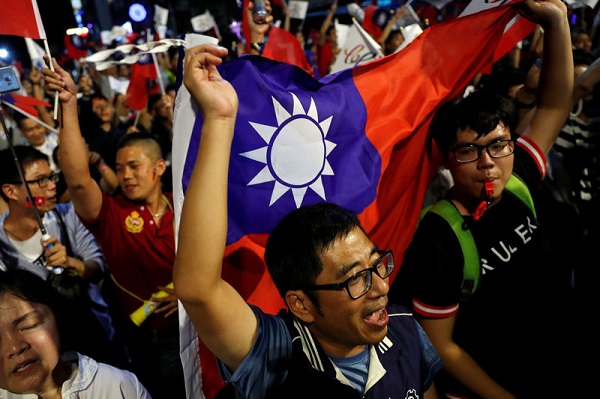Alwaght- Taiwan held its local election on Saturday. The Taiwanese went to polls which was seen as a referendum on the policies of their pro-independence government. According to the results, the Kuomintang (KMT) opposition party won the largest number of votes. The vote includes also 10 poll questions. If over 25 percent of the 19.76 million eligible voters say yes to these questions, a referendum on the future of Taiwan will be held.
One of the main controversial questions asked if the Taiwanese agreed with using name of Taiwan instead of Chinese Taipei in the 2020 Olympics games. The suggestion for a while aroused the ire of China officials. Under Beijing pressure, Taiwan is recognized in the international games as Chinese Taipei.
But the people’s vote for the opposition party a year ahead of the presidential election in practice indicates they are unhappy with the contentious policies of the ruling Democratic Progressive Party (DPP) which presses for secession from the mainland China.
Before the municipal election, the ruling party held 13 out of 22 cities and counties in Taiwan, a dominance allowed it to pick 4 out of 6 main mayors. But now the DPP sustained huge defeat in Kaohsiung and Taichung as the second and third-largest Taiwanese cities.
The defeat is mainly translated as the cause of wide-range discontentment with the ruling party’s policies. The main cause for the disagreement is the growing tensions between Taiwan and China in Taiwan Strait. This stood reason for the KMT to return to power in 2008. At the time, President Ma Ying-jeou not only highlighted the need to save “1992 consensus”, which accepts the One-China principle as the basis for shaping the Chinese-Taiwanese relations, but also ramped up the dialogue with Beijing on various political, economic, and social levels. In 2015, he met President Xi Jinping of China in a historic bilateral in Singapore. The meeting was first of leaders of China and Taiwan since the China Civil War ended in 1949.
But when the DPP won the election in 2016, President Tsai Ing-wen insisted that Taiwan was not part of China. He rejected the 1992 pact and One-China policy. The rejection, red as a contempt by Beijing, once against frayed the two sides’ ties.
It must be noted that the insistence of the Taiwanese ruling party on pressing with the policy of separation from China, which over the past few years has caused tensions with Beijing, caused the Taiwanese citizens to grow concerns about possible effects of such friction on their lives. Beijing hugely cut the number of Chinese tourists visiting Taiwan. The move heavily affected the Taiwanese tourism industry. China regularly sends its fighter jets and bombers around the island to put pressures on Taipei. These measures stir serious worries in Taiwan. So, the concerns about rising tensions and possible military confrontation undermined Ing-wen government and led to his party’s loss in the recent election.
From another perspective, the DPP loss will be of repercussions to the regional stability and the global powers’ policies in East Asia. Taiwan is an emerging confrontation field for growing rivalry between China and the US.
Beijing, buoyed up by the election results, welcomed the outcome in a statement. Ma Xiaguang, the press secretary of the Taiwan desk in Chinese State Council, stated that the local election outcome represents a Taiwanese people’s optimism about a stronger relationship with Beijing.
If KMT returns to power once again, Beijing scores a big win. As a result, the security and stability in Taiwan Strait as a potential flashpoint in East Asia will be restored as friendly ties between Beijing and Taipei will push away the possibility of military conflict. This development will play into China’s hands too because Beijing hands will be freed up from a major security challenge to focus on other areas of rivalry with Washington.
But the US does not find this China win a rejoicing development, especially under Trump who is in hard work pursuing the policy of curbing Chinese power gain in East Asia. Since 1970, various governments of the US respected One-China policy. Unlike his predecessors, President Donald Trump has beefed up security and military relations with Taipei. In mid-June, the US Department of State opened a new de-facto embassy in Taipei, a break with the One-China policy which drew strong Beijing protest.
On the other side, tension ease with Taiwan and other regional states will give Beijing a pressure tool to press Washington to cut military presence in East Asia. Over the past few years, the US intensified military presence in the region amid North Korea nuclear crisis and the dispute over the South China Sea shares among the regional countries. In addition to China, Vietnam, the Philippines, Malaysia, Taiwan, and Brunei claim shares in the South China Sea, which is a transit route for $5 trillion worth of goods annually.



























